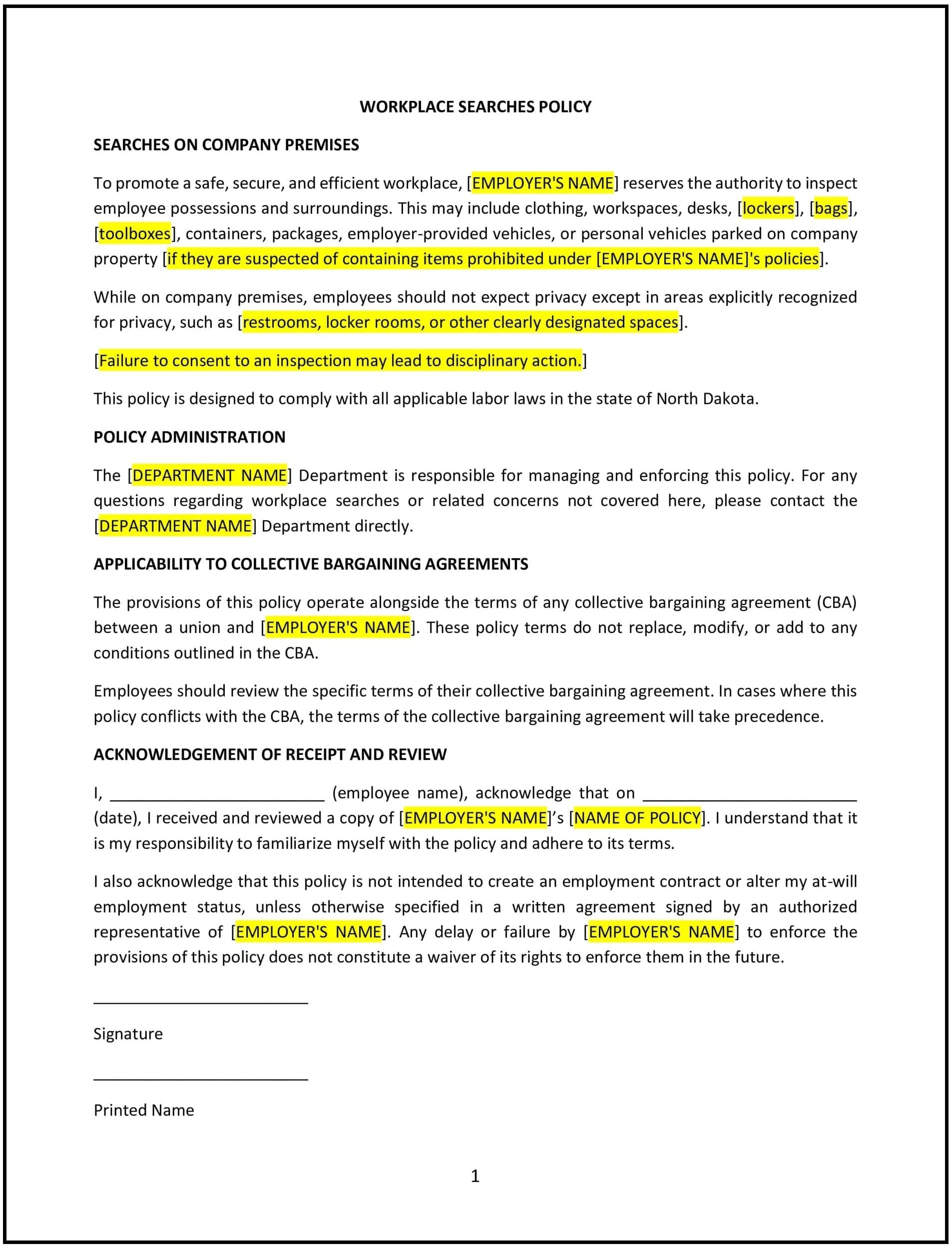Workplace searches policy (North Dakota): Free template
Got contracts to review? While you're here for policies, let Cobrief make contract review effortless—start your free review now.

Customize this template for free
Workplace searches policy (North Dakota)
A workplace searches policy helps North Dakota businesses establish clear guidelines regarding the right to search employee property or workspaces to ensure a safe and productive work environment. This policy outlines when and how workplace searches may occur, what types of items may be searched (e.g., personal bags, lockers, desks, electronic devices), and how the company will handle privacy concerns. The goal of this policy is to protect both the business and its employees from potential risks, including theft, harassment, and the presence of illegal or dangerous items in the workplace.
By adopting this policy, businesses in North Dakota can create a transparent and consistent approach to workplace searches, ensuring that employees understand their rights and the company’s expectations.
How to use this workplace searches policy (North Dakota)
- Define when searches are permitted: Clearly state the conditions under which workplace searches are allowed, such as when there is reasonable suspicion of misconduct, when required for safety or security reasons, or when employees are using company property. Specify whether random or scheduled searches are permitted.
- Clarify what can be searched: Outline which areas or items may be subject to search, such as personal lockers, desks, bags, and electronic devices (e.g., cell phones, laptops). Clearly indicate that searches are limited to what is necessary for maintaining a safe and productive work environment.
- Set expectations for privacy: Address employees' privacy concerns by explaining the extent of searches and any measures the company will take to respect personal privacy. This may include conducting searches in private spaces or with the presence of a witness. Ensure employees are informed that personal belongings may be searched if there is a legitimate business reason.
- Establish the procedure for conducting searches: Outline the process for conducting searches, including who will perform the search, how the search will be conducted (e.g., with a witness present), and how the employee will be notified of the search. Specify whether searches will be done during working hours or at other times.
- Ensure fair and consistent application: Specify that searches will be conducted in a fair and consistent manner, without discrimination or bias. The policy should make it clear that searches will be based on legitimate business reasons and applied equally to all employees.
- Provide consequences for non-compliance: Define the consequences for refusing to comply with a workplace search request, which may include disciplinary action up to and including termination, depending on the nature of the refusal or the reason for the search.
- Address the handling of findings: Specify how any findings from a search will be handled, including how items will be recorded, reported, and addressed. This includes reporting items that violate company policies, such as illegal substances, theft, or prohibited materials.
- Review and update: Regularly review and update the policy to ensure it reflects changes in North Dakota state laws, company needs, or industry best practices related to workplace privacy and searches.
Benefits of using this workplace searches policy (North Dakota)
This policy provides several benefits for North Dakota businesses:
- Promotes workplace safety and security: By clearly outlining the circumstances under which searches may take place, businesses can reduce risks related to theft, possession of illegal items, or unsafe behavior in the workplace.
- Protects company property: Ensuring that personal items do not contain company property, dangerous items, or unauthorized materials helps protect the organization’s assets and the well-being of employees.
- Fosters transparency: A clearly communicated policy builds trust by making expectations transparent, ensuring that employees understand when searches may occur and why they are necessary.
- Mitigates potential legal issues: A well-documented policy that is consistently applied helps protect businesses from legal risks related to privacy violations or unfair treatment during searches.
- Improves employee accountability: Establishing clear expectations and consequences for non-compliance can reduce misconduct and promote a culture of responsibility within the workplace.
Tips for using this workplace searches policy (North Dakota)
- Communicate the policy clearly: Ensure all employees are aware of the workplace searches policy, including when searches may occur and the procedures followed. Include the policy in employee handbooks, orientation materials, and reviewed during training sessions.
- Provide training to supervisors and HR: Train supervisors and HR personnel on how to conduct searches professionally and respectfully, ensuring that privacy and dignity are maintained during the process.
- Ensure consistency in enforcement: Apply the policy consistently across the organization to avoid any appearance of favoritism or discrimination. Ensure that searches are based on legitimate, non-discriminatory reasons.
- Respect privacy during searches: While conducting searches, take measures to respect employees' privacy. For example, searches should be done in private settings with a witness present to avoid unnecessary embarrassment or intrusion.
- Review the policy periodically: Regularly review and update the policy to ensure it remains relevant to company operations, complies with North Dakota state laws, and reflects evolving best practices in workplace security and privacy.